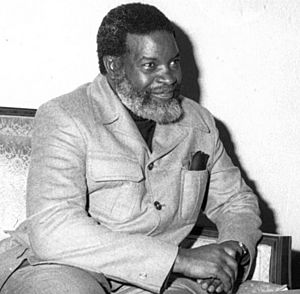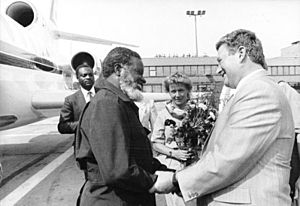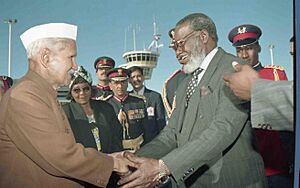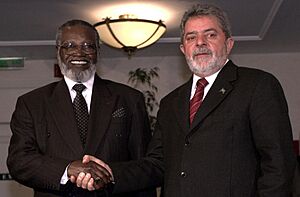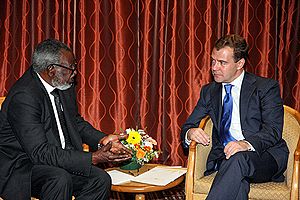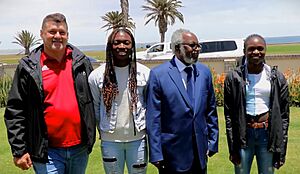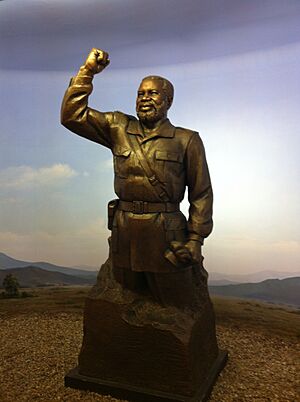Sam Nujoma facts for kids
Quick facts for kids
Sam Nujoma
|
|
|---|---|
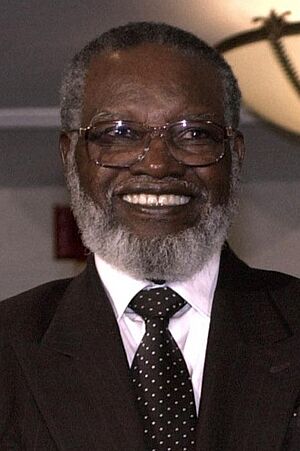
Nujoma in 2004
|
|
| 1st President of Namibia | |
| In office 21 March 1990 – 21 March 2005 |
|
| Prime Minister |
|
| Preceded by | Office established |
| Succeeded by | Hifikepunye Pohamba |
| President of SWAPO | |
| In office 19 April 1960 – 29 November 2007 |
|
| Preceded by | Office established |
| Succeeded by | Hifikepunye Pohamba |
| President of OPO | |
| In office 19 April 1959 – 19 April 1960 |
|
| Preceded by | Office established |
| Succeeded by | Office abolished |
| Personal details | |
| Born |
Samuel Shafiishuna Daniel Nujoma
12 May 1929 Ovamboland, South West Africa |
| Died | 8 February 2025 (aged 95) Windhoek, Khomas Region, Namibia |
| Resting place | Heroes' Acre, Windhoek, Namibia |
| Political party |
|
| Spouse |
Kovambo Nujoma
(m. 1956) |
| Children | 4, including Utoni |
| Alma mater | University of Namibia |
| Religion | Lutheran |
| Signature | |
Samuel Shafiishuna Daniel Nujoma (born 12 May 1929, died 8 February 2025) was a very important leader from Namibia. He was a revolutionary and worked against apartheid, which was a system of unfair racial separation. Nujoma served as the first president of Namibia for three terms, from 1990 to 2005. He was also a founder and the first president of the South West Africa People's Organisation (SWAPO) in 1960.
Nujoma started getting involved in politics against colonial rule in the 1950s. In 1959, he helped start the Ovamboland People's Organization (OPO), which wanted an independent Namibia. He was arrested in 1958 for organizing a protest and was sent away. In 1960, he left the country and went to Tanzania, where he was welcomed by Julius Nyerere, another African leader.
Nujoma was key in leading the fight for Namibia's freedom from South African rule. The OPO changed its name to SWAPO in 1960. Nujoma also created the People's Liberation Army of Namibia (PLAN) in 1962. This group started a guerrilla war against the South African government in August 1966. This happened after the United Nations said South Africa no longer had the right to govern Namibia. Nujoma led SWAPO during the long Namibian War of Independence, which lasted from 1966 to 1989.
Namibia became independent from South Africa in 1990. The country held its first democratic elections that same year. SWAPO won most of the votes, and Nujoma became the first president on 21 March 1990. He was re-elected two more times in 1994 and 1999. Nujoma stepped down as SWAPO party president on 30 November 2007.
Nujoma wrote his life story, Where Others Wavered, in 2001. He received many awards for his leadership, like the Lenin Peace Prize and the Indira Gandhi Peace Prize. The Parliament of Namibia gave him the titles "Founding President of the Republic of Namibia" and "Father of the Namibian Nation". In 2007, SWAPO called him "Leader of the Namibian Revolution".
Contents
Early Life and Education
Samuel Shafiishuna Daniel Nujoma was born on 12 May 1929. His birthplace was Etunda, a village in Ovamboland, which was then called South West Africa. His parents were Helvi Mpingana Kondombolo and Daniel Uutoni Nujoma. Helvi was a princess, which helped Nujoma gain influence later in his political life. He was the oldest of eleven children.
Nujoma spent his early years helping his family. He looked after his younger siblings and helped with farming. His chances for education were limited. He started school at a Finnish missionary school when he was ten. He finished Standard Six, which was the highest level black students could reach then.
In 1946, at age 17, he moved to Walvis Bay to live with his aunt. He got his first job at a store, earning a small salary. Later, he worked at a whaling station. There, he met people from different countries. This helped him learn about world politics.
In 1949, Nujoma moved to Windhoek. He worked as a cleaner for the South African Railways. At the same time, he went to night school to improve his English. He also studied for his Junior Certificate by mail.
Journey to Political Leadership
After World War I, South Africa took control of South West Africa. In 1948, the National Party in South Africa introduced apartheid. This system created strict racial segregation. These laws were also applied to South West Africa.
Nujoma became involved in politics in the early 1950s. He joined trade unions. His experiences at work and learning about independence movements in Africa shaped his views. He was fired from his job in 1957 because of his political activities.
In 1957, a group of Namibians formed the Ovamboland People's Congress (OPC). They were against South African policies, especially the unfair contract labor system. Nujoma became friends with one of the founders, Andimba Toivo ya Toivo. In 1959, Nujoma helped start the Windhoek branch of the OPC. By then, it was renamed the Ovamboland People's Organization (OPO). Nujoma was elected its first president.
He secretly traveled around Namibia, gathering support for OPO. In September 1959, the South West African National Union (SWANU) was formed. This group brought together different anti-colonial groups. Nujoma joined its leadership, representing OPO.
After a protest in December 1959, Nujoma was arrested. He was accused of organizing the resistance. He was released after a week. The OPO leaders decided Nujoma should go into exile. He would join other Namibians who were asking the UN for help.
In February 1960, Nujoma left Namibia. He traveled through several African countries. He met with leaders like Julius Nyerere of Tanzania. Nyerere helped him get a passport. Nujoma also met other important African nationalist leaders. These meetings influenced his belief in a united Africa.
In April 1960, the OPO changed its name to the South West Africa People's Organisation (SWAPO). This happened in New York, and Nujoma was elected president even though he wasn't there. He arrived in New York in June 1960. He spoke to the United Nations General Assembly Fourth Committee. Nujoma demanded that South West Africa become independent by 1963.
He returned to Tanzania in 1961. From there, he and other activists built SWAPO into a strong international group. He got support from other African leaders, especially Julius Nyerere. Nujoma set up SWAPO's main office in Dar es Salaam. He also arranged for Namibians to get scholarships and military training.
Leading the Fight for Independence
In 1962, SWAPO created its armed group, the South West African Liberation Army (SWALA). This group was later renamed the People's Liberation Army of Namibia (PLAN). Nujoma himself got the first weapons. They were brought from Algeria through several African countries to Omugulugwombashe in Ovamboland.
Nujoma continued to travel and speak to leaders around the world. SWAPO opened offices in Africa, Europe, and the Americas. He represented SWAPO at the start of the Non-Aligned Movement in 1961. He also attended the founding of the Organisation of African Unity (OAU) in 1963. In 1965, the OAU recognized SWAPO as the only true representative of the Namibian people.
On 21 March 1966, Nujoma and Hifikepunye Pohamba tried to return to Namibia. They wanted to test South Africa's claim that Namibians in exile could come back freely. They were arrested at the airport and sent back to Zambia the next day.
On 26 August 1966, the first armed clash happened. SWALA fighters had set up a camp at Omugulugwombashe. South African forces attacked them. This attack marked the beginning of the Namibian War of Independence. The war lasted for more than 25 years.
In 1969, Nujoma was confirmed as SWAPO President at a conference in Tanzania. In 1974, the Portuguese Empire collapsed. This made it easier for guerrilla fighters to cross the border from Angola into Namibia. Nujoma realized this would change the war. Over the next two years, SWAPO's military operations moved their base from Zambia to Angola.
Many SWAPO supporters left Namibia to join the movement in exile. Nujoma's son, Utoni Nujoma, and his two brothers were among them. Nujoma led the SWAPO negotiation team. They talked with a group of Western countries and South Africa. They also talked with African countries about a plan for free elections in Namibia. This plan became United Nations Security Council Resolution 435 in September 1978.
However, it took another ten years for the plan to be put into action. South Africa delayed things. Also, the U.S. linked the withdrawal of Cuban troops from Angola to Namibia's independence. On 19 March 1989, a cease-fire agreement was signed with South Africa. This led to the start of Resolution 435.
After 29 years away, Nujoma returned to Namibia in September 1989. He led SWAPO to victory in the UN-supervised elections. These elections prepared the way for independence. Nujoma returned just before the UN deadline for Namibians to register to vote. The Constituent Assembly, elected in November 1989, chose him as Namibia's first president. Nujoma was sworn in on 21 March 1990. Important leaders like Javier Pérez de Cuéllar (UN Secretary-General) and Nelson Mandela were there.
President of Namibia: Leading a New Nation
As the head of SWAPO, Nujoma was chosen as president. This happened after SWAPO won the UN-supervised election in 1989. He was sworn in by UN Secretary-General Javier Pérez de Cuéllar on 21 March 1990.
When Namibia became independent, it was very divided. This was due to a long history of colonialism and racial discrimination. One of Nujoma's first big achievements was to announce a policy of "national reconciliation." This policy aimed to improve relations between all of Namibia's different racial and ethnic groups.
Under his leadership, Namibia made steady economic progress. The country kept a democratic system. It also respected human rights and followed the rule of law. Nujoma worked to remove the unfairness left by apartheid. He wanted to build a society where everyone was treated equally, regardless of their race.
In 1990, Nujoma started a plan for land reform. This plan aimed to give land from white farmers to black citizens. By 2007, about 12% of the commercial farmland had been given to black citizens.
Nujoma was re-elected as president in the December 1994 election. He won with 76.3% of the votes. The constitution of Namibia was changed to allow him to run for a third five-year term in 1999. This change was only for Nujoma. He won the 1999 election with 76.8% of the votes.
The constitution did not allow Nujoma to run for a fourth term in 2004. Hifikepunye Pohamba was chosen as the SWAPO candidate for president. Pohamba was seen as Nujoma's chosen successor. Pohamba won the November 2004 election. He was sworn in as the second president of Namibia on 21 March 2005.
In 1998, Nujoma supported the president of the Democratic Republic of Congo, Laurent Kabila. Kabila's rule was threatened by rebels. Namibia joined the war to support the DRC's independence. Nujoma saw this as defending the DRC's right to govern itself.
Nujoma was a strong supporter of the Cheetah Conservation Fund in Namibia. He also supported the rights of women and children. He called for fathers to support their children. He also opposed the practice of removing widows from their family homes.
In 2000, Nujoma co-chaired the United Nations' Millennium Summit. This meeting led to the creation of the Millennium Development Goals (MDGs). These goals aimed to improve global development.
Nujoma played a key role in dealing with Namibia’s HIV/AIDS crisis. He worked to raise awareness and develop policies. Under his leadership, Namibia created its first National Strategic Plan on HIV/AIDS. This plan included ways to prevent, treat, and care for people with HIV. His government worked with groups like the WHO and UNAIDS. They secured money and support for HIV programs. They also slowly expanded access to antiretroviral therapy (ART) for treatment.
Life After Presidency
Even after stepping down as president, Nujoma remained active in politics. He often campaigned for SWAPO at rallies. In 2009, Nujoma earned a master's degree in geology from the University of Namibia.
After leaving the presidency, Nujoma lived on his private farm near Otavi. He also stayed at a SWAPO-owned property outside Windhoek. In 2015, the government gave him an official residence.
Personal Life and Family
Nujoma married Kovambo Theopoldine Katjimune on 6 May 1956. They had three sons and one daughter. Their children were Utoni Daniel (born 1952), John Ndeshipanda (1955–1993), Sakaria "Zacky" Nujoma (born 1957), and Nelago Nujoma (born 1959). Sadly, Nelago died at 18 months old while Nujoma was in exile. His wife joined him abroad two decades later. Nujoma's oldest son, Utoni, is a high-ranking politician in SWAPO. He has served in the government and the National Assembly.
Nujoma's father, Daniel Uutoni Nujoma, was arrested in 1966. He died in prison in 1968. Nujoma's mother, Kuku Helvi Mpingana Kondombolo, passed away in November 2008. She was reportedly over 100 years old.
Nujoma's autobiography, Where Others Wavered, was published in 2001.
Passing and Legacy
Nujoma made his last public appearance at the funeral of President Hage Geingob in February 2024. In July 2024, Nujoma was hospitalized in Windhoek due to illness. He had been ill the month before and missed a public event.
Sam Nujoma died on 8 February 2025, at a hospital in Windhoek. He was 95 years old. The Namibian government announced a period of national mourning. Nujoma's remains were transported to several regions in Namibia. A memorial service was held at Independence Stadium on 28 February 2025. Nujoma was buried on 1 March 2025 at Heroes' Acre.
The African National Congress in South Africa lowered its party flags to half-mast to mourn Nujoma. Cuba declared three days of national mourning for him.
In December 2005, an act of parliament gave former president Nujoma the title "Founding Father of the Namibian Nation." Since 2012, his picture has appeared on some of the country's banknotes.
Nujoma was known as a "charismatic" and "fiery" leader. He was highly respected in Namibia for leading the country to independence. He also guided it towards democracy and stability. The National Assembly said his work helped create a constitutional democracy. This democracy was based on freedom, unity, and prosperity.
The Namibian newspaper described him as "the last of his generation of African liberation struggle leaders." They placed him alongside figures like Nelson Mandela and Julius Nyerere. Another article in the same paper listed "Ten reasons to be thankful to Sam Nujoma." These reasons included his tireless work for independence. They also mentioned his practical approach in government. This helped the country avoid difficult situations. His "One Namibia, One Nation" approach rejected tribalism. His decision to step down after three terms was also highlighted.
Honors and Awards
| Date of award | Honour/award title | Reason for award | Awarding body |
|---|---|---|---|
| 1973 | Lenin Peace Prize | USSR | |
| 1980 | Frédéric Joliot-Curie Gold Medal | World Peace Council | |
| 1984 | Medaglia Pontificia (Pope's Medal) Anno VI | The Vatican City, Italy | |
| 1988 | Grant Master Order Merit: The Grant Cruz (Highest Order) | Brazil | |
| 1988 | Ho Chi Minh Prize | Ho Chi Minh Peace Award | Vietnam |
| 1988 | The Namibia Freedom Award | For his leadership role in the struggle against apartheid | California State University, USA |
| 1988 | Honorary Citizenship of the City of Atlanta | For his leadership role in the struggle for freedom, national independence and social justice | Atlanta, USA |
| 1988 | Recognition granted | City and County of San Francisco | |
| 1988 | Recognition granted | City of Chicago | |
| 1988 | Recognition granted | City of East Palo Alto | |
| 1990 | Indira Gandhi Peace Prize for Disarmament and Development | In recognition of his outstanding contribution in leading the people of Namibia to freedom | India |
| 1991 | Medaglia Pontificia (Pope's Medal) Anno XIII | The Vatican City, Italy | |
| 1991 | Order of José Martí | Cuba | |
| 1991 | Ordre du Merite Congo | Republic of Congo | |
| 1992 | Chief of Golden Heart | Kenya | |
| 1992 | Order of the National Flag (First Class) | Democratic People's Republic of Korea | |
| 1994 | "Grand Cordon" Decoration | Tunisia | |
| 1995 | Grand Master of the Order of Welwitschia | Namibia | |
| 1995 | Order of Liberty (Grand Collar) | Portugal | |
| 1995 | Africa Prize for Leadership for the Sustainable End of Hunger | The Hunger Project | |
| 1996 | Order of Good Hope (Gold) | South Africa | |
| 2002 | Order of Friendship Award | Vietnam | |
| 2003 | O.B.F.F.S. | Romania | |
| 2003 | Fellowship Award of the Institute of Governance and Social Research | In recognition of his contribution to the liberation of his country, the establishment of Democratic foundation, peace and Political stability in Namibia, and the enhancement of the dignity of the Black Man | Institute of Governance and Social Research, Nigeria |
| 2004 | Companion of the Order of the Star of Ghana (Ghana National Highest Award) | As an expression of respect and admiration of the Government and people of Ghana | Ghana |
| 2004 | Founding President of the Republic of Namibia and Father of the Namibian Nation | In recognition of his dedication to his selfless sacrifice to the national liberation struggle and nation-building | Namibian Parliament |
| 2004 | Lifetime Conservation Award | Cheetah Conservation Fund (Nujoma was the international patron of this organisation since 1991) | |
| 2007 | Leader of the Namibian Revolution | SWAPO Party of Namibia | |
| 2008 | International KIM IL Sung Prize Certificate | Democratic People's Republic of Korea | |
| 2010 | Sir Seretse Khama SADC Meda | SADC | |
| 2016 | Order of Solidarity "El Mehdi Ben Barka" | Awarded to Third World personalities who have won the esteem of the peoples of Africa, Asia and Latin America because of their struggle and outstanding contribution in the common battle for freedom, independence, peace, economic development and social justice. | Cuba |
| 2018 | Order of the Companions of O. R. Tambo | For his opposition to the government of Apartheid South Africa | South Africa |
| 2021 | Order of Francisco de Miranda First Class | By the President of the Bolivarian Republic of Venezuela, Nicolás Maduro, and the Venezuelan Minister of the People's Power for Foreign Relations, Jorge Arreasza | Venezuela |
Honorary University Degrees
| Date of award | Title | Awarding university |
|---|---|---|
| 1973 | Honorary Doctorate of Law | Ahmadu Bello University, Nigeria |
| 1975 | Honorary Doctorate of Computer Science | Ombwana University, Malawi |
| 1986 | Certificate of Honour | University of Ibadan, Nigeria |
| 1990 | Honorary Doctorate Degree of Law | Lincoln University, USA |
| 1990 | Honorary Doctorate Degree of Law | National University of Lesotho, Lesotho |
| 1992 | Honorary Doctorate Degree of Technology | Federal University of Technology Minna, Nigeria |
| 1993 | Honorary Doctorate Degree in Education | University of Namibia |
| 1993 | Honorary Doctorate Degree of Law | Central State University, USA |
| 1996 | Doctor of Laws | University of Atlanta, USA, |
| 1997 | Honorary Doctorate Degree of Laws | Rutgers, The State University of New Jersey, USA |
| 1998 | Honorary Doctorate Degree | Russian Economic Academy, Russia |
| 1998 | Honorary Doctorate Degree | Peoples' Friendship University of Russia, Russia |
| 1999 | Honorary Degree of Doctor of Public Service | La Roche College, USA |
| 1999 | Honorary Degree of Doctor of Laws | University of Zimbabwe |
| 2003 | Honorary Degree of Doctor of Science | Abubakar Tafawa Balewa University, Nigeria |
| 2005 | Honorary Doctorate in Public Management | Polytechnic of Namibia |
| 2006 | Honorary Professor | China University of Geosciences |
| 2015 | Doctor of Philosophy in Peace and Conflict Studies | University of Zambia |
See also
 In Spanish: Sam Nujoma para niños
In Spanish: Sam Nujoma para niños
- History of Namibia
- Aaron Mushimba, brother-in-law and prominent businessperson
- Andimba Toivo ya Toivo, co-founder of both OPO and SWAPO
In Books and Film
- Sam Nujoma, Where Others Wavered, The Autobiography of Sam Nujoma, London 2001
- Namibia: The Struggle for Liberation, an epic film by Charles Burnett, showing the Namibian independence movement through Nujoma's eyes.
 | Tommie Smith |
 | Simone Manuel |
 | Shani Davis |
 | Simone Biles |
 | Alice Coachman |


